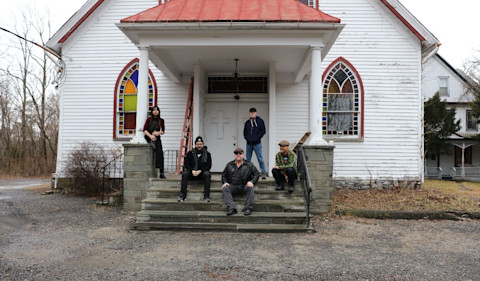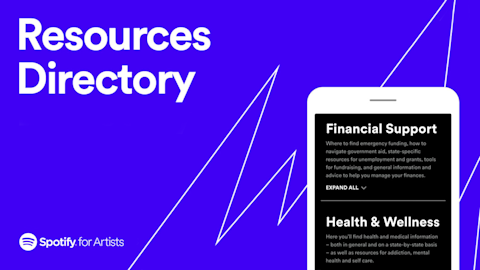Music executive and author David Airaudi demystifies the industry.
If you want to know how to navigate the music business, you can't ask for a better tour guide than David Airaudi. He's worked on strategy with big names like Kanye West and JAY Z, helped develop the careers of zeitgeist-defining acts like Odd Future and The Internet, and served as CEO for a company spearheaded by Pharrell Williams. He founded and is CEO of artist-innovation agency Three Quarter.
Airaudi has compiled a fair chunk of his wisdom in Made Luck: The Modern Musicians Field Manual, and it isn't your typical music-business book. "When I first left Interscope to start my company," he says, "my tagline was, 'Artists are entrepreneurs.' And I treat them as such." Airaudi's book, similarly, cuts through the mystique that surrounds music and guides creative people through the business world. It's filled with anecdotes and sharp observations on where the music industry is now, and where it might be headed in the future. Airaudi didn't craft it to be a step-by-step guide; his main mission is to build musicians' confidence about being businesspeople in addition to creative entrepreneurs.
We asked Airaudi for what he thought up-and-coming musicians should know before diving into the deep end of the business.
Do: Practice performing to figure out who you are and what you like.
Airaudi says that recording—even in a home studio—is critical to getting an idea for your art sketched out. "You're ideating," he says. "What is this? What do I sound like? What do I want to do?"
Then, booking a concert at a small venue will give you a feel for live performance—and your attitude toward it. "If you book a show locally and you go play and four people show up, which is what's going to happen, and you end the show and you're like, 'Yo, that was amazing,' then you should be touring," he says. "But if you're like, 'Only four people showed up, and this sucks. I feel like I did a terrible job,' then maybe touring is not what you should be doing." Although Airaudi acknowledges that touring is not absolutely essential to getting your career off the ground, he maintains that live performance creates a strong foundation. "There are other ways in the business that you can operate," he says. "You can be an artist now and not have to tour. But I think that's a key way to start. Do a show. How do you feel? Do you like it? Are you good at it?"
Do: Learn to think like a businessperson.
Much of Made Luck focuses on demystifying the music business, giving concrete definitions to opaque jargon like "record deal" and "line check" while also puncturing myths about the "rock star" ideal. This is deliberate, says Airaudi. "We make things overly complex," he says. "We make artists feel like the record deal is some holy grail, and it's some crazy thing they don't really understand, but they know they need one. But they don't know why they need one."
When it comes down to it, music is a business, and knowing its nuts and bolts is as essential as it is to any other business. "We stay away from those terms or don't like to talk in those terms or think in those terms, at first," says Airaudi. "It's like, 'Music industry? These people are silly.' But your inability to get over the fact that an Excel spreadsheet is not cool is hindering [things]."
Photo Courtesy of David Airaudi
Do: Be confident in your own ability to guide—and expand upon—your art.
"Kanye West is a perfect example," says Airaudi. "From the beginning, he was like, 'No, I'm this good. I am great. I am making great art. I am changing the world with my art. You need to value that. You're all wearing what I'm wearing? Now I'm going to make it. You're all wearing my shoes? Now I'm going to make shoes.' At the time, he was demonized for that. But that, to me, that is the essence of where we are in the music business and the ends of where we need to go. "
Beginning with your music, of course, is essential. But realizing its maximum potential is as well, and it can start with something as unassuming as a piece of merch. "I see artists who understand their value, who are making unbelievable art that's impacting millions of people, and who are realizing the value across the entire market," he says. "Not with [records] and CDs, but with shoes, with shirts, with fashion shows, with whatever is the natural extension of that artist's ethos. That is the pinnacle of where artists and art should be going, and where business should be following and helping us to go."
Don't: Define success on anyone else's terms.
While there are certain fundamentals of business that shouldn't be ignored, pursuing success in the music business means following your own impulses—whether they're telling you to dominate the world or not. "The other myth that's starting to pop up is, 'You've got to be Kanye, you've got to be JAY-Z,'" says Airaudi. "No, you don't. Maybe you could be just be you. If your art is you and your music is you, then your business should be you…. Everyone defines success in a different way."
Airaudi stresses that the most important part of music—and what generates the mystique that Made Luck punctures—is its ability to create connections between performers and their audiences. Success shouldn't be defined by how much money you make, or the size and renown of your tours. "Going back to the essence of this book, we are human beings, creating art, trying to find our way in the world," he says. "If that is the baseline we're starting from, then maybe making [$50,000] a year on some guitar pedals, some merch, some streaming money, and some publishing checks is enough. People might say, 'Oh, you're not on tour, you didn't play Coachella.' No, but maybe you don't want to play Coachella. That's okay.
"At the end of the day, it's a business," he adds, pointing out that every business isn't made to be huge. "You can run a small mom-and-pop cupcake shop in a non-hipster area, and if that's your definition of success, then do that. Don't be carried away by all the other myths and mystiques that are trying to get you off track."
Do: Design the career that's right for you.
Airaudi's original draft of Made Luck included more than a few case studies, but the final copy dispenses with the specific advice in favor of broader lessons. This is deliberate. "There isn't a cookie-cutter approach," he says. "But the beautiful part about streaming, and the beautiful part about festivals, and the beautiful part about all of these platforms, is that they exist to help you create a real functioning career as an artist. The lie that we've been sold is that there's a specific way to use all these tools and a specific result that will happen if you use them. But the reality is: All of these are just tools. You've got to use those tools to build your own house. It's going to be yours, and it's going to be designed the way you want it."
—Maura Johnston
Popular Stories
video
How Julia Wolf Made It




